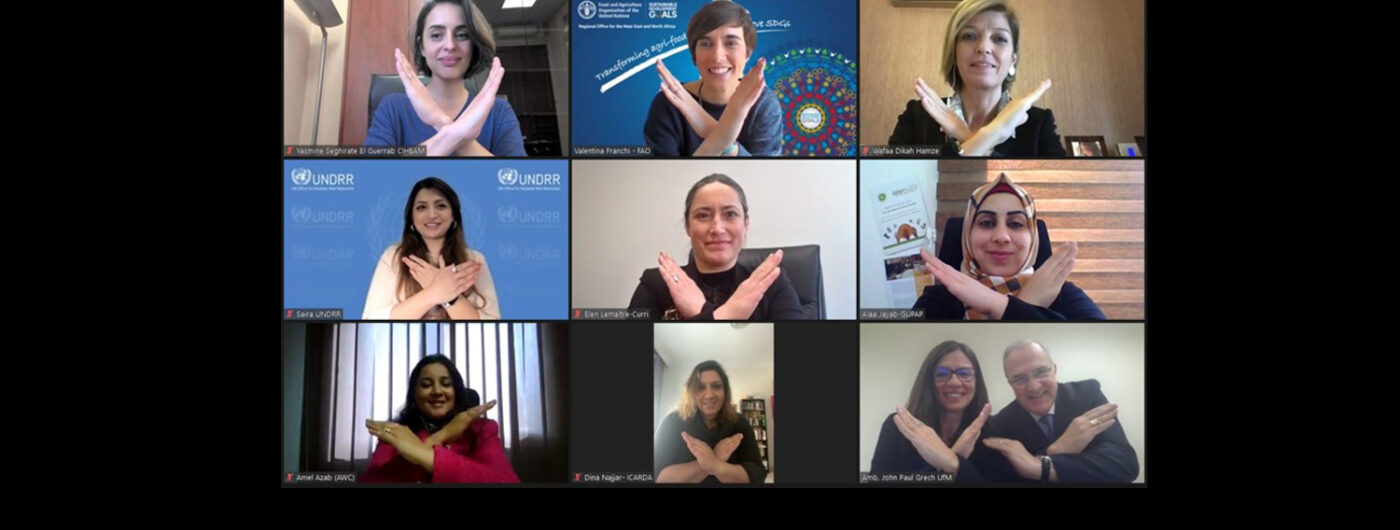
Agri-food systems facing climate change in the MENA region: gender equality for better resilience
The UfM, in partnership with the Regional Office for the Near East and North Africa of FAO and the International Center for advanced Mediterranean agronomic studies (CIHEAM), organized the online event “Agri-food systems facing climate change in the MENA region: gender equality for better resilience”.
7 March 2022. In the context of the 2022 International Women’s Day, recognizing this year the contribution of women and girls to build a more sustainable future, the UfM organised, in partnership with the Regional Office for the Near East and North Africa of FAO and the CIHEAM , the online event on “Agri-food systems facing climate change in the MENA region: gender equality for better resilience” to identify challenges faced by women as change drivers for a more resilient agri-food systems facing climate change. Moreover, possible solutions were put forward in terms of policies, strategies and governance at regional and country levels.
The opening remarks by Abdulhakim Elwaer, Assistant Director General and Regional Representative, FAO Regional Office for the Near East and North Africa highlighted the important role that women play in agri-food systems in the face of climate change and water scarcity in the region, despite the persisting inequalities that constraint their potential and empowerment. He also pointed out to the need to strengthen collaborations across the region to consolidate and accelerate efforts.
However, because of persistent bias and discrimination, women have less opportunity to thrive and have limited access to technology, financial instruments and actual land ownership. In this regard, Elen Le maître-Curri, director of Plan Bleu, recalled that the effects of climate change aggravate an already complicated situation for the agri-food systems of the MENA region, marked by limited natural resources, food insecurity, or even rural areas that are losing part of their population, especially the youngest and most active. A set of challenges that affect women differently than men.
In the round table a constructive exchange took place, bringing together experiences from across the region, thanks to the contribution of institutions and organizations, such as ICARDA, UNDDRR, Arab Water Council and GUPAP among others.
The discussion focused its attention on the need to foster rights and fair policies in order to support the most fragile groups, namely women, girls and children. Women – especially in rural communities – provide for their families and contribute to the resilience of their communities while being paid less than men and are often those affected by discriminating policies and harmful social norms which exclude them from the relevant decision-making processes. When it comes to the migrations caused by climate change, women are the most vulnerable and it is therefore important to include political measures to promote women’s priorities linked to climate change events.
Social bias has been identified as very visible in the region: power dynamics at the community level prevent women from excelling in knowledge and experience. It is therefore important to raise awareness to fight discriminatory social norms, and to do so the involvement of men is an essential tool as well as the creation of women networks to exchange best practices.
In his closing remarks the Deputy Secretary General of the UfM, John Paul Grech, highlighted “Women leadership is a key factor to be ensured when outlining climate resilient policies. It is key that women actively participate in the discussions and decisions over climate change mitigation and adaptation, as they possess unique skills and knowledge to help respond to climate change effectively and sustainably”.
This joint event by the UfM, in partnership with the Regional Office for Near East and North Africa of FAO and the International Center for advanced Mediterranean agronomic studies (CIHEAM) stems from their commitment to promoting gender equality and women’s empowerment in agri-food systems, and to creating a conducive environment for women and girls to lead and thrive.
